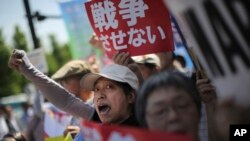Japan's Cabinet endorsed a set of defense bills Thursday that would allow the country's military to go beyond its self-defense stance and play a greater role internationally, a plan that has split public opinion.
Hundreds of citizens rallied outside Prime Minister Shinzo Abe's office, calling the bills “war legislation” that turn Japan toward militarism. They say the move would tarnish nearly 70 years of efforts by Japan to regain international trust and identity as a pacifist nation.
After its defeat in World War II, Japan renounced war under the U.S.-drafted constitution that bans the use of force as a means of settling international disputes.
Abe and his government say that stance leaves Japan vulnerable as China asserts itself in the region and that Japan should be better prepared to defend itself and help more in international peacekeeping.
To appeal to the pacifist point of view, the bills' names include “peace and security” and “international peace support.”
Abe is set to explain the bills in a news conference later Thursday before he sends them to parliament for further discussions.
The bills would remove geographic restrictions on where the military can operate, among other changes, and the government says they are needed to change domestic law in line with Japan's national security policy under Abe. Supporters call it a proactive peace contribution and a way for Japan to be a normal country.
Public split
Media polls show public opinion divided.
“I was born right after the war, but during this time Japan was able to gain prosperity and trust from the world because of our peace constitution, because that gained trust from the world community, and we all worked so hard to get here, with the peace constitution as our pride,” said Taeko Otaki, a 68-year-old homemaker at the rally outside Abe's office.
One of the changes would allow Japan to defend its allies, rather than only itself, based on the government's reinterpretation of the constitution last year. Opponents say the reinterpretation undermined the Constitution and democracy because it did not follow the formal process of changing the document.
Koichi Nakano, an international politics professor at Sophia University in Tokyo, says the changes are problematic because they would allow the prime minister and a handful of leaders to make crucial decisions, such as dispatching troops overseas, without due process.
“I think it is possible that Japanese diplomatic power may be enhanced by this but also there are people who are worried that Japan's peace brand, the image of Japan as a pacifist country, is going to be damaged,” he said.
Japan Cabinet Endorses Bills to Allow Greater Defense Role

TOKYO —










